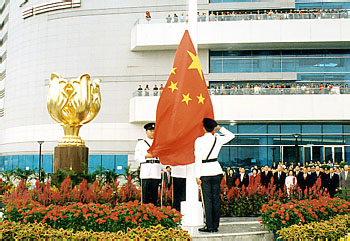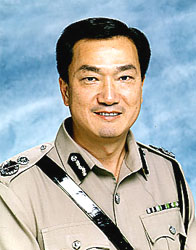



















|
| ||
 THE national flag at the harbour front promenade of the Hong Kong Convention and Exhibition Centre is raised every morning at 8 am (then lowered at 6 pm) by a team of three Hong Kong Police officers from the Security Unit, PHQ. The flag post is located beside the gold-plated sculpture entitled "Forever Blooming Bauhinia". This patriotic duty began on 1 October during the start of National Day celebrations, at which time the flag was raised and lowered by the Colour Party of Police Training School (pictured above) |
Last week, at the Association of Chief Police Officers' Conference held in Warwick, England, the Hong Kong Police Deputy Commissioner, Management,
Tsang Yam-pui spoke with candour and eloquence on the state of Hong Kong and its police force 100-plus days after the territory's reunification with China . . . | |
|
I HAVE asked for the opportunity to speak at this conference in order to give you an up-to-date account of the situation in Hong Kong, including the new status of the Hong Kong Police Force, the changes which have taken place and how we stand in terms of liaison with overseas police forces, including those in the United Kingdom. ¡@The 1st of July has come and gone. Hong Kong is now in its fourth month of existence as a Special Administrative Region of China. The whole of the civil service remains the same civil service. The Governor was replaced on the 1st of July by our Chief Executive, who is a Hong Kong person. So far, since the transfer of sovereignty, apart from the change of flags and emblems and replacement of the British garrison by the Chinese garrison, there has been virtually no change. It is very much business as usual. ¡@There are street demonstrations, as usual. Law suits against Government, as usual. Media scrutiny, as usual. Complaints against the police, as usual. This situation is what most of the people in Hong Kong have expected it to be. ¡@Although foreign affairs are the responsibility of the PRC Central Government, we continue to play host to 102 countries, including the United Kingdom, whose governments are represented in Hong Kong in the form of a consulate general or a trade commission. Representing the Hong Kong SAR government overseas we have seven Economic and Trade Offices in seven major cities including London. You may be surprised to hear that American warships, which have been using Hong Kong as a port for reprovisioning and holiday for their crews since the Korean War, continue to call at Hong Kong at more or less the same frequency as before. It is, as I said before, business as usual. ¡@What is unusual is that the Police Force has been kept extremely busy throughout the whole period, dealing first of all with the major events related to the transfer of sovereignty and lately with the IMF-World Bank Conference held in Hong Kong and hosted by the People's Republic of China. Fortunately, during this period, crime and other matters have remained low. Crime, especially, is the lowest recorded in the last 15 years. ¡@Also on the plus side, Hong Kong's economy remains very buoyant. High growth rate, stable inflation level and full employment continue. This kind of situation, as we all know, bodes well for law and order. ¡@THEN, what about changes which have occurred to the police force in Hong Kong? We have dropped the title "Royal" and are now simply known as the Hong Kong Police Force. As you know, we have summer and winter uniforms and they remain unchanged. Our insignia and badges of rank have changed slightly, with the Crown replaced by a bauhinia, which is the symbol of our city. The whole of the police force, 34,000 strong, remains almost intact except for a number of expatriate officers who were entitled to, and chose to retire early under Her Majesty's Overseas Compensation Scheme. There are still some 440 expatriate officers remaining in the Force to date. | ||
|
INaddition to Chinese, English is recognised as an official language under the Hong Kong
Basic Law, which is our constitution. Therefore, English continues to be used throughout the
Government, the courts and the legislature. Both Chinese and English are being used in parallel
in many areas of our work.
¡@Our legal system has undergone some minor changes. Previously the Privy Council was the ultimate arbiter in criminal appeal cases. This function has not, however, been taken over by the corresponding mainland Chinese Court. In place of the Privy Council, the Basic Law has provided for the establishment of a Court of Final Appeal and stipulated that in addition to local permanent judges, a number of overseas judges will be invited to sit as non-permanent judges. On 8 September 1997 Lord Irvine of Lairg, the Lord Chancellor, agreed in principle that two serving Law Lords will be made available to sit on the Court of Final Appeal. |
 Deputy Commissioner, Management, Tsang Yam-pui | |
|
¡@Operationally, one of the major changes that has occurred as a result of the change in sovereignty has been the manning of our border with mainland China. In years gone by, this function was performed by the British military, but is now the responsibility of the Hong Kong police. The land border is some 34 kilometres long, and although there is a very strong border fence, we have deployed a total of some 500 police officers, and the latest motion detection technology, to ensure that the immigration policy between the Hong Kong Special Administrative Region and mainland China is strictly observed. Entering Hong Kong other than through the Immigration Border Checkpoints remains illegal. Those arrested for doing so will be repatriated back to mainland China in the same way as before. ¡@As regards to our status, we are a separate police force from the Chinese mainland police organisation. In China, all the provincial police units come under the policy direction of the Ministry of Public Security in Beijing, but this arrangement does not apply to the Hong Kong Police Force. The relationship between the Hong Kong Police Force and the Police organisation in mainland China is built on the agreement of the following three simple principles: Our Commissioner is responsible to the Chief Executive of the Hong Kong SAR; There should be mutual co-operation and; There should be mutual support. ¡@Liaison with the Ministry of Public Security and the Public Security Units in the Provinces is being conducted on a well-practised framework, which existed for 12 years prior to the changeover of sovereignty. The only change is that the Hong Kong Police Force is now a sub-bureau of NCB China in the Interpol network. We now attend Interpol conferences using "Hong Kong (China)" as our title, and have been given the same amount of freedom by NCB China as we were previously given by NCB UK. Hong Kong therefore continues to participate in Interpol and other international forums with the same amount of autonomy as before. ¡@ON the question of extradition, while under the British Administration, we had extradition arrangement with 94 countries through the extension of the Commonwealth Scheme and treaties which the UK had with other countries. After the 1st of July, extradition is conducted under locally enacted Hong Kong legislation and is not derived from any such powers under Chinese law. Some eight countries (Canada, Australia, Malaysia, the Philippines, the Netherlands, India, Indonesia and the USA) have signed extradition agreements with us. We have also initialled agreements with New Zealand and Singapore. A number of other countries, including the UK, are in different stages of negotiation with the Hong Kong SAR Government on this issue. ¡@On the question of international liaison, we have an officer seconded to the General Secretariat of the ICPO in Lyon. We have another officer on the staff at the Bramshill Police College here. These secondments will continue. ¡@The Force also places much emphasis on overseas training. Every year, we send no less than 120 officers to different countries for a wide range of skill and development training. For development training, we have extended our scope to include more non-police management courses. For example, we have been sending officers to the Henley Staff College courses in the UK for many years and in the past two years we have started sending officers to management courses at the Harvard University and Stanford University in the USA. In Hong Kong, we also intend to run more professional courses for police officers from overseas forces. These will be mainly to do with crime related issues, such as narcotics, triad and other organised crime topics. ¡@TO conclude, Hong Kong today is very much the same as Hong Kong yesterday in terms of our system, thinking and way of life. The only difference is that we intend to capitalise on our new relationship with mainland China in order to build an even more prosperous and stable society for our people in Hong Kong. While we start a new relationship with mainland China, we will continue our relationships with our former partners and associates. We intend to strengthen old ties and build new ones. This is why I am here today. The Hong Kong Police Force and the UK Police service enjoyed a close and happy relationship for many years and hopefully this relationship will continue for many more years to come. | ||

